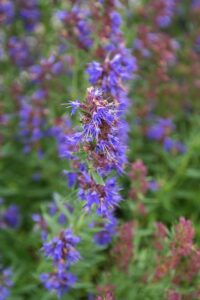In the age of synthetic medications and fast-paced living, reconnecting with the natural world’s therapeutic bounty is a precious pursuit for many. Hyssop (Hyssopus officinalis), a modest yet marvelously potent flowering herb, encapsulates the essence of nature’s capacity to heal. For centuries, hyssop has been revered for its medicinal properties, serving as a stalwart in the apothecaries of various cultures. Today, we’re unpacking the healing powers of hyssop and the health benefits from ancient lore to modern scientific validation, to its applications in our everyday health practices.
This information is meant to be educational and entertaining, not as medical advice.
Historical Background and Folk Medicine
Hyssop Across Civilizations and Cultures
Hyssop has woven its way through the tapestries of human history, leaving a trail of healing anecdotes in its wake. References to this herb are strewn across ancient texts, from the Judeo-Christian Bible, where it’s noted as a purifying agent, to medical scripts of the Greeks and Romans. In the Arab world, hyssop was revered for its vermifuge properties, expelling parasites, and aiding digestion. In traditional Chinese medicine, it was used for similar indications, as a potent herb in tonics and detoxifiers.
The Folk Medicine of Hyssop
Folk medicine tales offer a glimpse into the varied applications of hyssop. In Europe, it was a primary ingredient in the highly regarded ‘holy herb water’, believed to ward off evil spirits and used in religious ceremonies. Its role in traditional medicine, passed down through generations, highlights its versatility—from a ritualistic smoke to soothe coughs and clear the head to a wound healer and an antifungal foot wash.
Chemical Constituents of Hyssop
Pinocamphone and Iso-pinocamphone: Stars of the Show
Pinocamphone and iso-pinocamphone, while tricky to pronounce, are critical components that bestow hyssop with its renowned respiratory benefits. These compounds have shown mucolytic and expectorant properties, aiding in the relief of respiratory issues like bronchitis and asthma.
Thujone: A Double-Edged Sword?
Thujone content in hyssop, although associated with some controversy due to its presence in wormwood, is known for its potential influence on mental clarity and alertness, offering benefits for brain function. However, it’s essential to note that high doses of thujone can be toxic or may cause convulsions.
Rosmarinic Acid and More
The herb is also rich in rosmarinic acid, best known for its anti-inflammatory and antioxidant activities. In hyssop, this compound is crucial in mitigating oxidative stress and reducing inflammation in the body, supporting holistic well-being.
Health Benefits and Research Studies
Respiratory Respite
Newer studies are corroborating what traditional wisdom espoused all along—hyssop is a boon for the airways. Recent research has highlighted its efficacy in the treatment of respiratory ailments, particularly in its ability to relieve cough, bronchial discomfort, and expel phlegm.
Digestive Comfort
Hyssop also shines in digestive health. From calming an upset stomach to promoting good digestion, this herb’s carminative and anti-spasmodic actions offer relief from discomfort associated with bloating, gas, and nausea.
Mental Clarity and Alertness
For those seeking clarity and focus, hyssop may hold the key. The aromatics and thujone content in the herb can work synergistically to improve cognitive function and uplift the mind.
Anti-Inflammatory and Antioxidant Punch
The potent anti-inflammatory and antioxidant properties of hyssop can be pivotal in the management of chronic diseases. Reducing oxidative stress and modulating inflammation can have far-reaching implications for overall health.
https://pubmed.ncbi.nlm.nih.gov/35069979/
https://pubmed.ncbi.nlm.nih.gov/31694395/
https://pubmed.ncbi.nlm.nih.gov/32523876/
https://pubmed.ncbi.nlm.nih.gov/24312758/
How to Use Hyssop in Your Health Regimen
Brewing a Healing Cup
The most straightforward way to experience hyssop’s health benefits is through a steaming cup of hyssop herbal tea. Brewing the dried herb in hot water extracts its healing compounds, making it a soothing drink for maintaining respiratory and digestive health.
Tinctures and Supplements
For individuals preferring more concentrated forms, hyssop tinctures and supplements are available. Ensuring appropriate dosages are crucial to avoid the potential side effects of thujone or other reactive properties.
Topical Applications
Hyssop can also be used topically, either as an essential oil or in a poultice, to treat wounds or skin conditions due to its antiseptic and antimicrobial properties.
Precautions and Side Effects
A Word of Caution
While hyssop offers a myriad of health benefits, like any medicinal herb, it should be used with care. High doses or prolonged use can lead to adverse effects, including dizziness, convulsions, or nausea. It is always best to talk to your medical provider before using any herb. Just because it is natural does not mean it can’t be harmful.
Contraindications
Individuals with epilepsy or pregnant and nursing women should avoid hyssop due to its thujone content. It’s always wise to consult with a healthcare professional before adding hyssop to your regimen, especially when being treated for a medical condition or already taking medication.
Concluding Remarks
Hyssop stands as a testament to the healing wonders that the natural world provides. Its versatility in addressing various health concerns makes it a valuable addition to any holistic health regimen. From herbal teas to supplements, there are numerous ways to incorporate hyssop into your daily routine, reaping its multifaceted benefits.
In exploring the world of herbal medicine, hyssop reminds us of the beauty and efficacy of nature’s pharmacy, beckoning us to accept its offerings with gratitude and understanding. While it is a best-kept secret for some, for those who have unlocked its powers, it remains a steadfast companion in their quest for holistic health.
Note that individual health status and conditions can vary significantly, and medical guidance should always be sought before beginning any new health protocol, including the introduction of herbal remedies. With prudence and education, the magnificent healing potential of hyssop can be harnessed safely and effectively for a voyage back to natural well-being.

